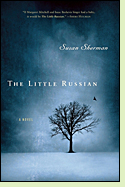The Little Russian
by Susan Sherman
Reviewed by Margaret Donsbach

The Little Russian is about a Jewish woman from Ukraine, which at the turn of the twentieth century was affectionately or not-so-affectionately known as "Little Russia." Berta travels home to visit her family, unaware she will not be returning to her stylish life in Moscow where she has been living with relatives. If she is more than a touch snobbish and fond of luxury, she is also a naïve creature teetering on the brink of a fate far worse than disappointment at being buried once more among the peasantry, forced to wait on the humble customers of her father's village grocery shop.
The Russias, Great and Little, are lands of stark contrast between rich and poor, upper class and lower. Everyone, though, looks down on the Jews. To many, they are scapegoats. Vicious pograms can break out at any time, sending mobs killing and looting through Jewish communities. Some Jews organize, working to promote the socialism that many believe will grant "civic rights and freedom from the anti-Jewish laws of the czar." When a war with Germany begins, Russians suspect Jews of collaborating with the enemy. The Bolshevik Revolution, intended to give every citizen a fair standard of living, only drags everyone down to the same dirty, cold, hungry scrabble for existence.
The Little Russian covers a similar time period as Pasternak's classic Doctor Zhivago, but is a more modest story without literary pretensions, revolving around a smaller life. Berta is no intellectual and no ministering angel. Steadfast in affection for the husband she wins, determined in her love for the children she bears, she is not given to musing on philosophical or political ironies. She is a woman with forgivable flaws trying to survive in a train wreck of a country. (2012, 332 pages)
More about The Little Russian at Powell's Books or Amazon.comOther novels set during the Russian Revolution:
Doctor Zhivago by Boris Pasternak (1957), written by an author who lived through the Revolution; Pasternak won the Nobel Prize for Literature the year after its publication. More info
The Jewel of St. Petersburg by Kate Furnivall (2010), about an aristocratic young Russian woman whose affair with a Danish engineer causes a scandal in the years leading up to the Russian Revolution. More info
The True Memoirs of Little K by Adrienne Sharp (2010), about Mathilde Kschessinska, a ballerina with the Russian Imperial Ballet who was Tsar Nicholas II's mistress before the Revolution. See review or more info at Powell's Books
Nonfiction about Jews in the Russian Revolution:
The Revolution of 1905 and Russia's Jews by Stefani Hoffman (2008). More info
Russian Jews Between the Reds and the Whites, 1917-1920 by Oleg Budnitskii (2011 in English translation). More info
A Piece of Her Heart: The True Story of a Mother and Daughter Separated by the Russian Revolution and the Lives Their Families Built While Apart by Sissy Carpey (2009). More info
At the Movies:
Doctor Zhivago
Online:
History of the Jews in Ukraine at Wikipedia
Back to 20th Century: Europe before the World Wars
Back to Directory of Book Reviews